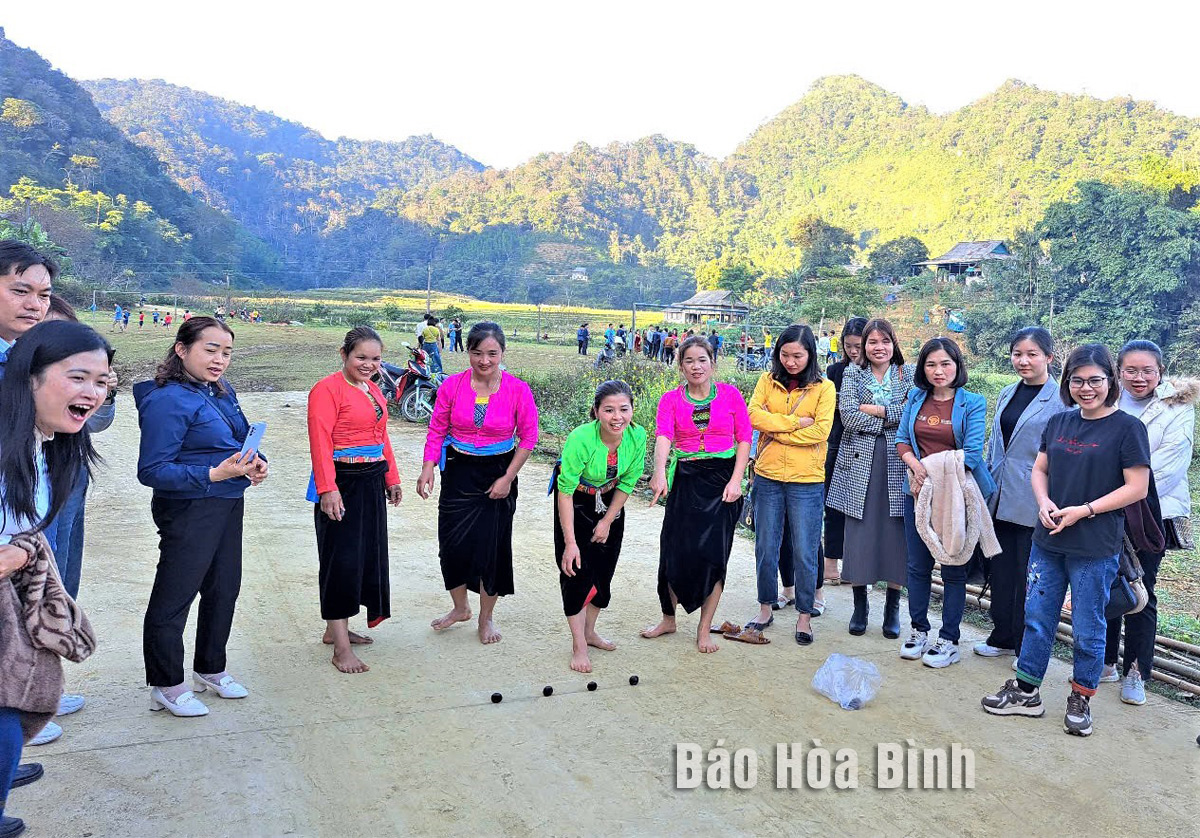
The northwestern province of Hoa Binh has been initiating many practical activities to preserve, protect and turn cultural values of the Muong ethnic group into resources to serve the province’s socio-economic development.
Hoa Binh plans to restore "danh mang” - a folk game of the Muong ethnic group and turn it into a mass sport.
In Hoa Binh province, the Muong ethnic group makes up over 63% of its population. Muong cultural heritage is recognised as an invaluable asset that helps strengthen community connection. In 2024, as part of the project to preserve and promote Muong cultural heritage and the Hoa Binh Culture in the 2023-2030 period, the province has initiated numerous concrete activities to tap into the unique values of Muong culture.
The steering committee for the project directed the preparation for the establishment of a cultural heritage preservation area linked to tourism development in Tan Lac district. The provincial Department of Culture, Sports, and Tourism proposed the provincial People's Committee to assign the Tan Lac district People's Committee to develop a preservation planning scheme and make the area a "living museum" that retains the values of traditional cultural identity.
The provincial museum continued to restore valuable bronze drums to preserve and exhibit the heritage of Hoa Binh's bronze drums. The museum's director To Anh Tu said that nine out of 74 valuable bronze drums in the museum's collection have already been restored.
In November 2024, on the occasion of the Vietnam Heritage Day and the provincial culture-tourism week, the museum held a themed exhibition titled "Treasures of the Muong," featuring two valuable collections of bronze drums and Muong gongs, attracting many visitors, especially students.
Additionally, last year, the province invited scientists to research and evaluate the values of the cave complex and the scenic site of Tien pagoda in Phu Nghia commune, Lac Thuy district. The provincial People's Committee submitted a proposal to the Ministry of Culture, Sports, and Tourism to seek governmental approval for creating a scientific dossier to classify the site as a special national monument.
An issue that many cultural researchers and the community paid attention to was the study about designs of architectural models of traditional Muong stilt houses and the use of alternative materials. The Department of Construction has initiated this project and consulted relevant departments. They are drafting a handbook on the architectural styles of traditional Muong stilt houses and modern alternatives for local reference. Additionally, there is ongoing research and collection to develop standardised designs for traditional and ceremonial costumes of the Muong people to promote in local community and to tourists.
The province has made efforts to preserve and promote intangible cultural heritage. It collaborated with the Vietnam Institute of Music and other localities to finalise a scientific dossier on the Mo Muong heritage to submit to the Prime Minister for recognition by UNESCO as intangible cultural heritage in need of urgent safeguarding. Inventory and collection activities for the Muong's intangible cultural heritage are underway, with four elements already included in the national heritage list - Mo Muong of Hoa Binh, Muong gong art, Khai Ha festival, and Muong bamboo calendar. The province is also preparing two more dossiers for submission to the Ministry of Culture, Sports, and Tourism regarding intangible cultural heritage.
In 2024, the province conducted an inventory of the intangible cultural heritage of ethnic groups in Lac Son district and Hoa Binh city, focusing significantly on the Muong group. The province has also restored and preserved several traditional festivals of the Muong people.
Quach Thi Kieu, Director of the Department of Culture, Sports, and Tourism, affirmed that reviving the unique cultural values of the Muong ethnic group has become a resource for socio-economic development, particularly in tourism. Various models have emerged in districts and cities, focusing on preserving and promoting the Muong's beautiful traditional identity to create a sustainable tourism environment, producing unique and attractive tourism products, thereby enhancing the quality and competitiveness of the province’s tourism.
The Standing Board of the Hoa Binh provincial Party Committee has agreed in principle on a proposal by the Standing Board of the Party Committee of Hoa Binh city to gather feedback on the city’s 1:2000 zoning plan, which forms part of its broader urban development strategy.
Hoa Binh province has made notable progress in public administration reform and digital government development, with the satisfaction index among citizens and businesses reaching over 84%, according to recent government evaluations.
Thanks to great efforts by local authorities in recent times, the governance and public administration performance of Mai Chau district has been significantly improved.
In the afternoon of June 6, the Party Committee, the People's Council, the People's Committee and the Fatherland Front of Lac Son district solemnly held a meeting to celebrate the 139th anniversary of the district's founding (1886–2025) and the 79th anniversary of the establishment of the district's Party Committee (1946–2025). There was the attendance of Mr. Bui Van Thang, the Vice Chairman of the Provincial People's Council; Mr. Quach Tat Liem, the Vice Chairman of the Provincial People's Committee; Ms. Dang Bich Ngoc, the Deputy Head of the National Assembly Delegation of the province; as well as the former leaders of the province and district through various periods, who are the natives of the district.
Implementing the Politburo’s Resolution No. 57-NQ/TW on breakthroughs in science – technology, innovation, and digital transformation is a golden opportunity for the northern mountainous province of Hoa Binh to renew growth model, improve competitive edge and shorten digital gap.
Resolution 57-NQ/TW, issued by the Politburo on December 22, 2024, identifies sci-tech, innovation, and digital transformation as strategic breakthroughs to build a developed and prosperous nation. In Hoa Binh province, this spirit is not just a slogan, it’s being put into action through concrete initiatives that form a "new development triangle”: digital citizenship, digital economy, and digital administration.



